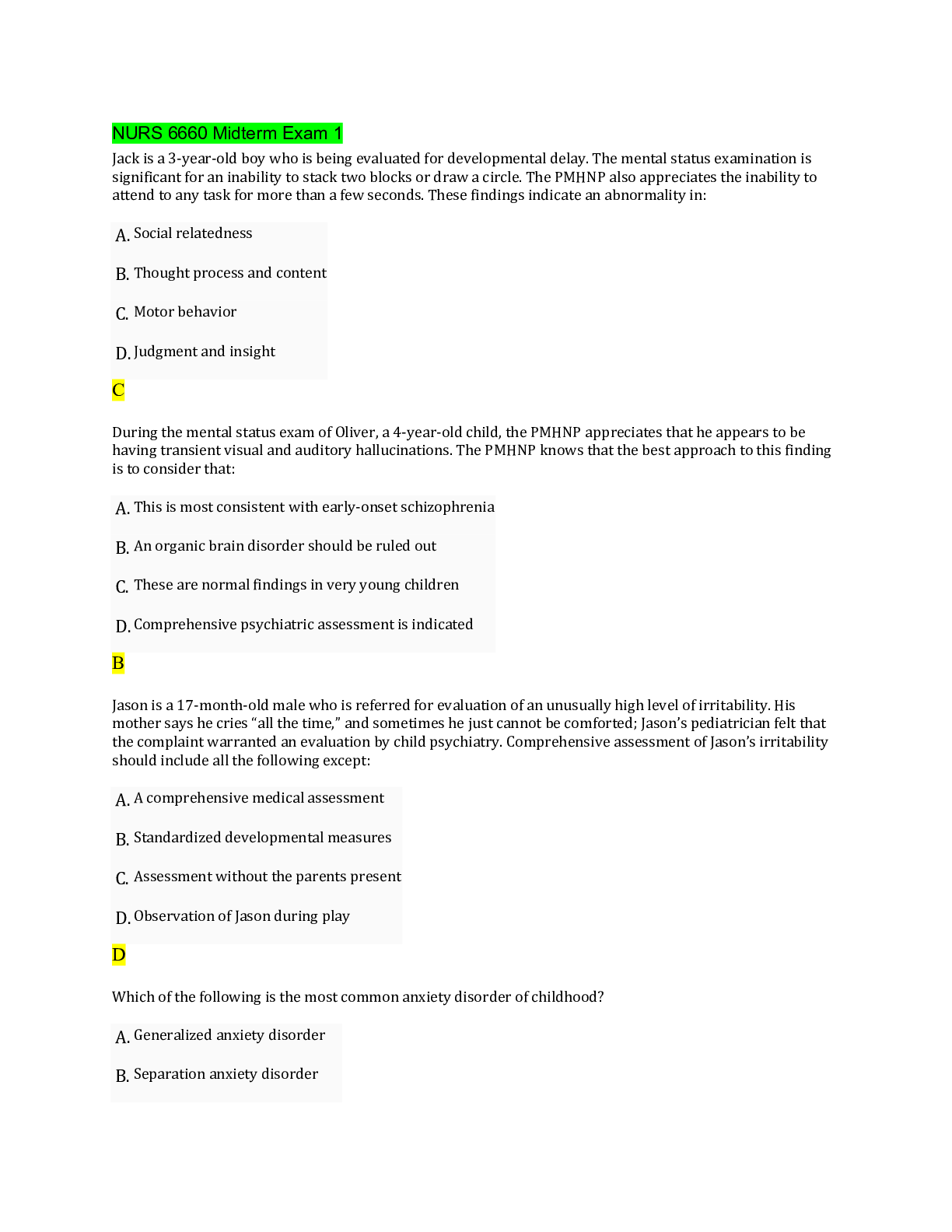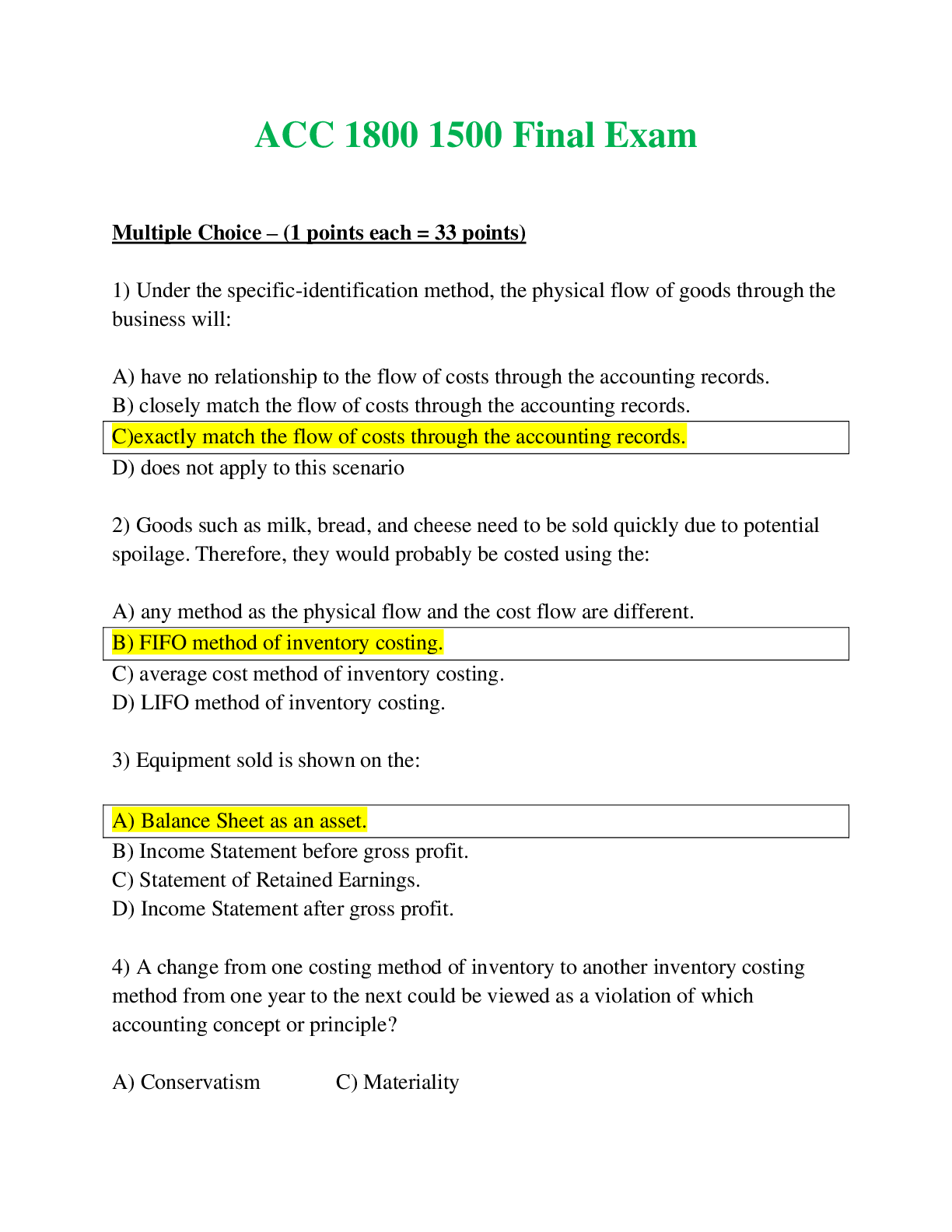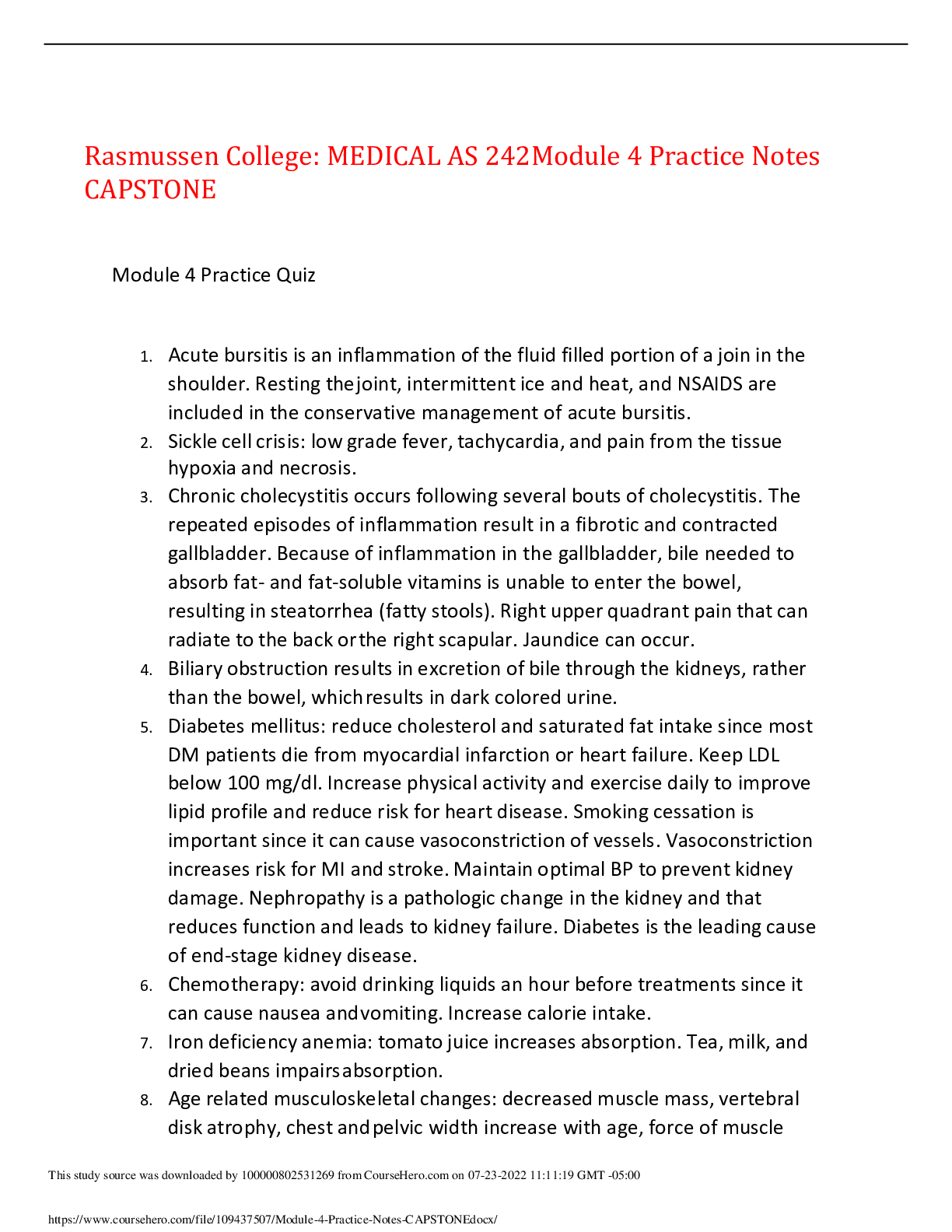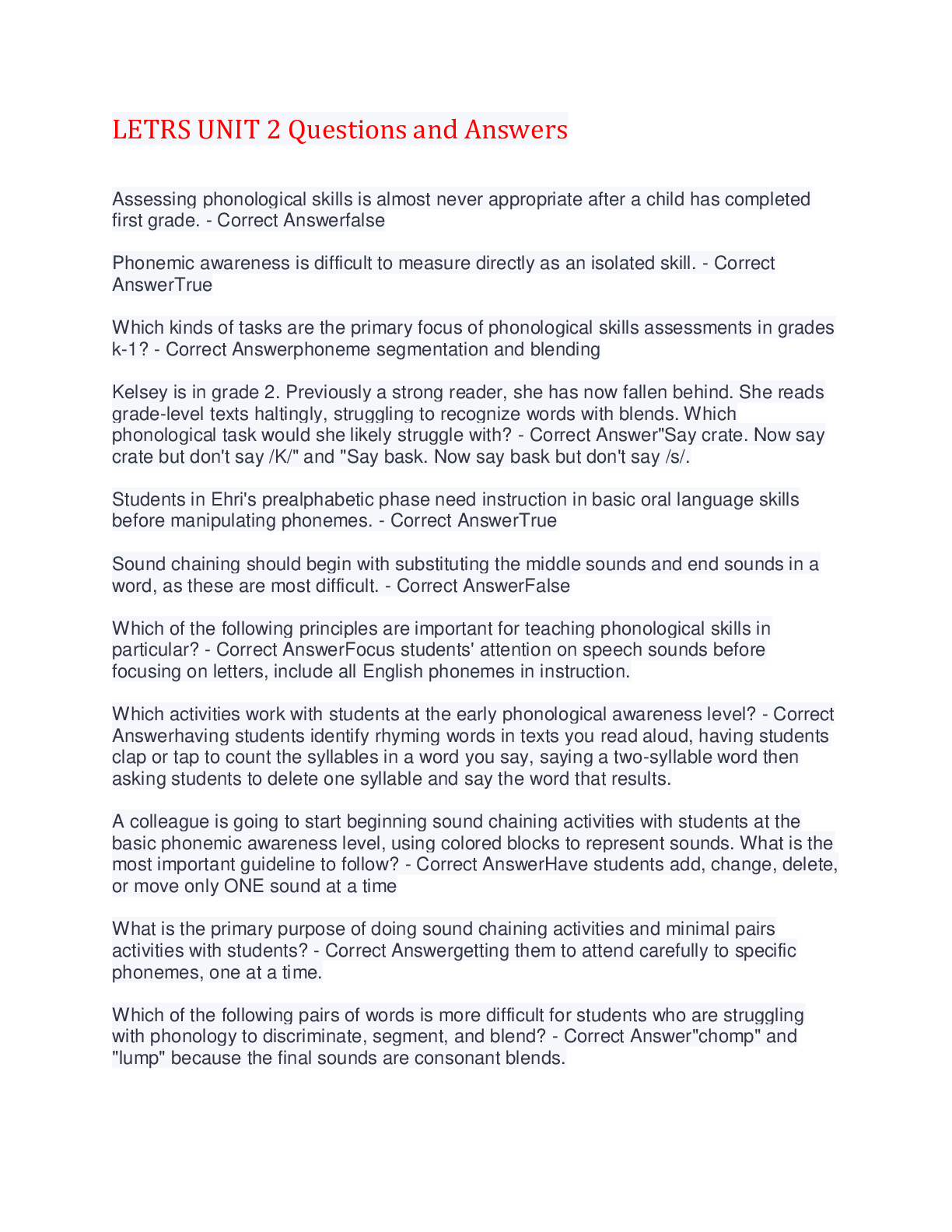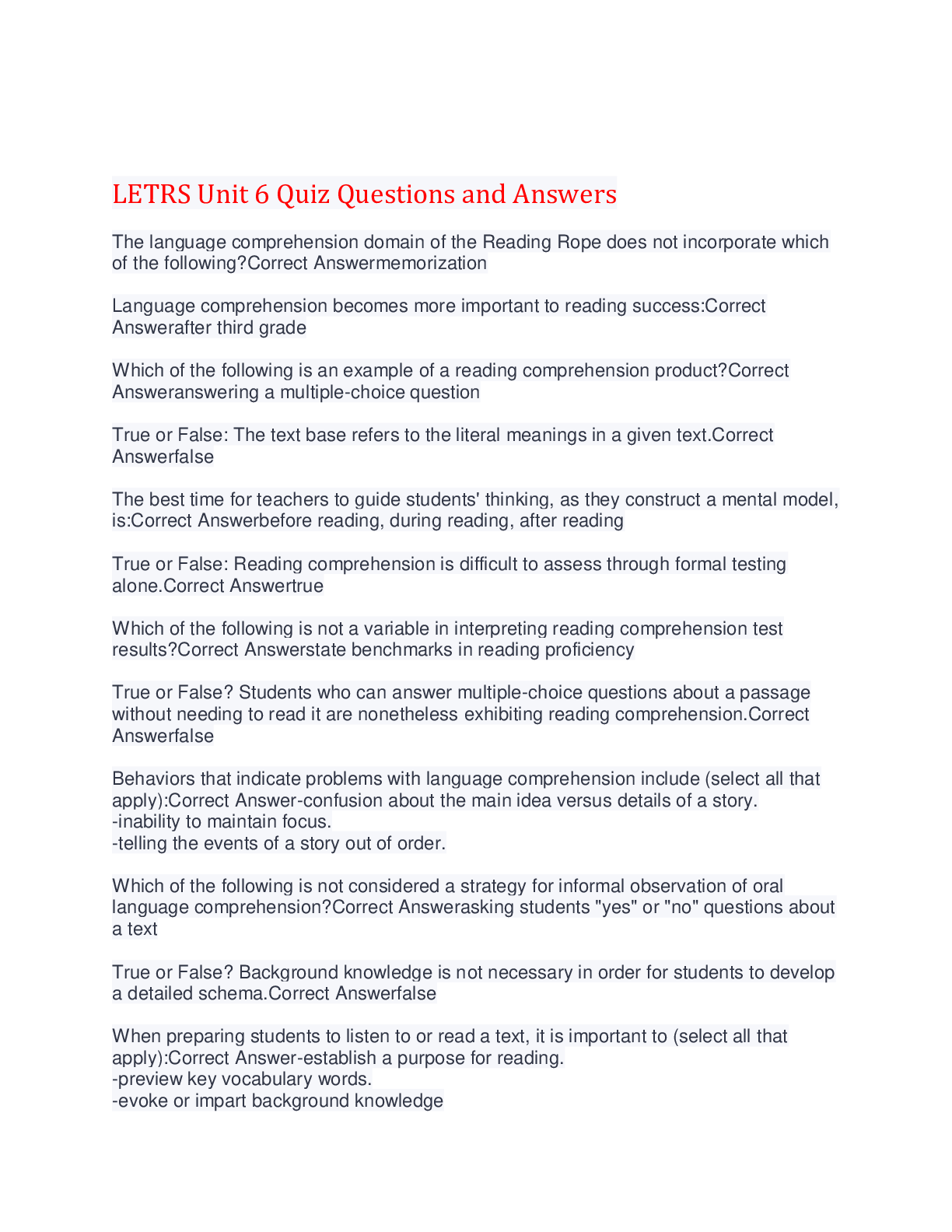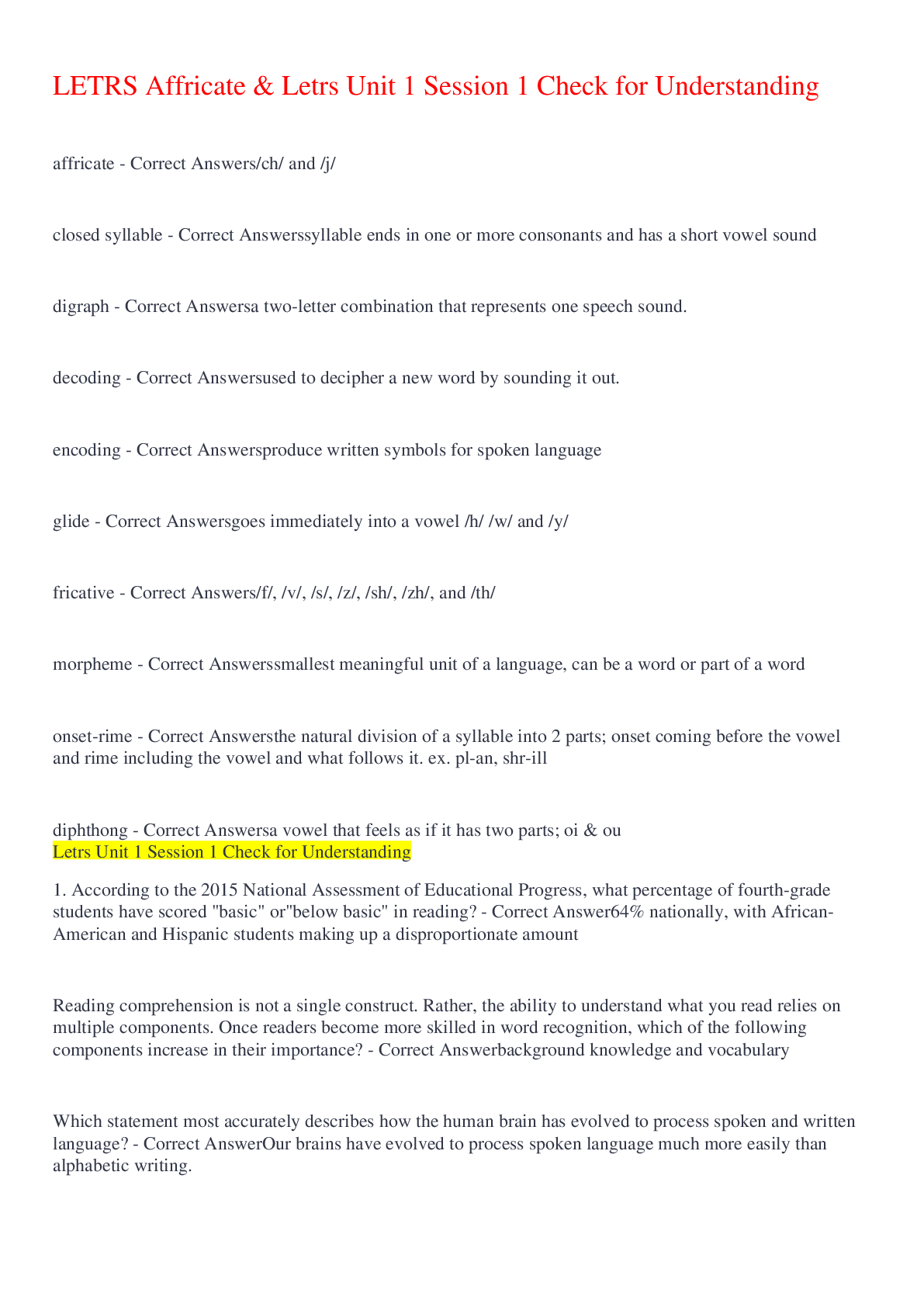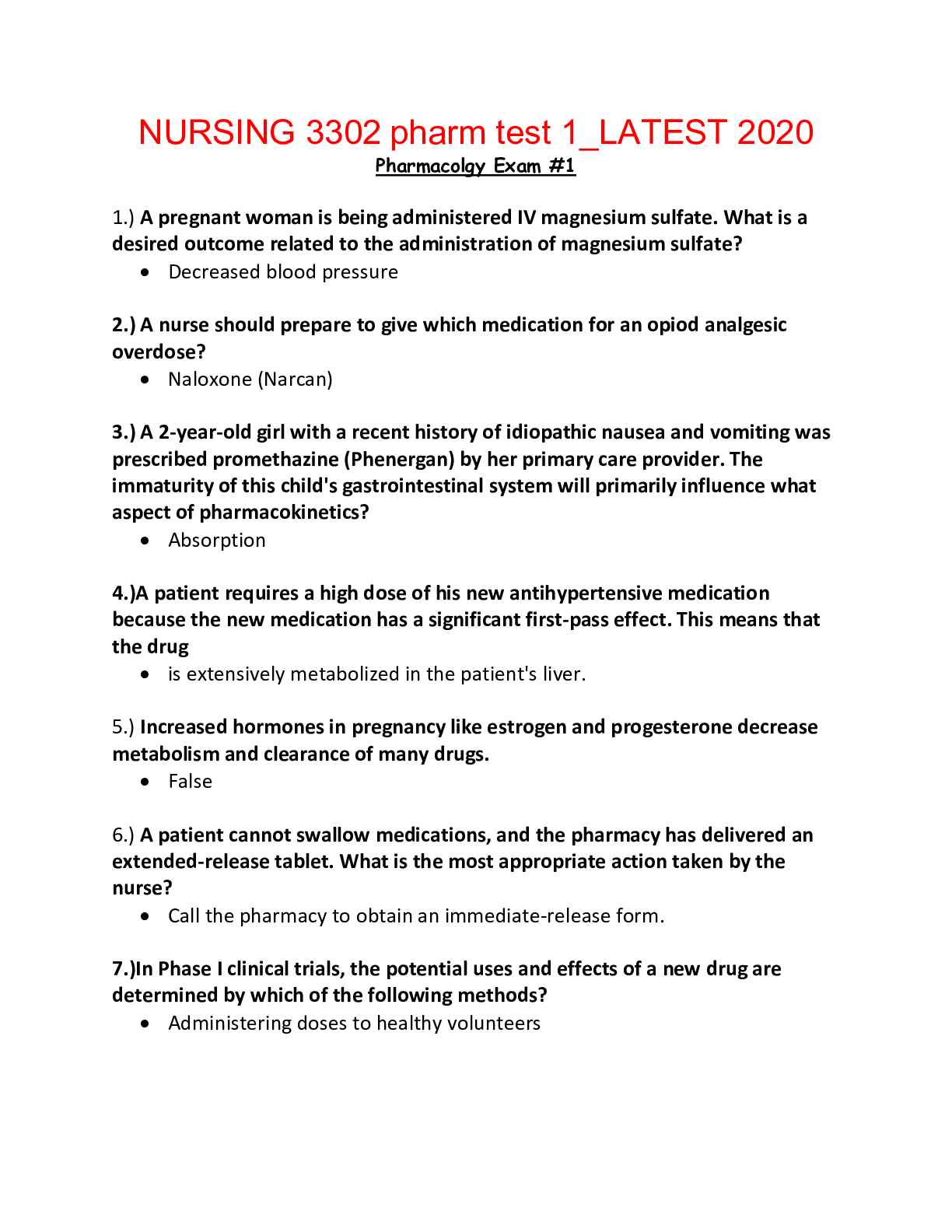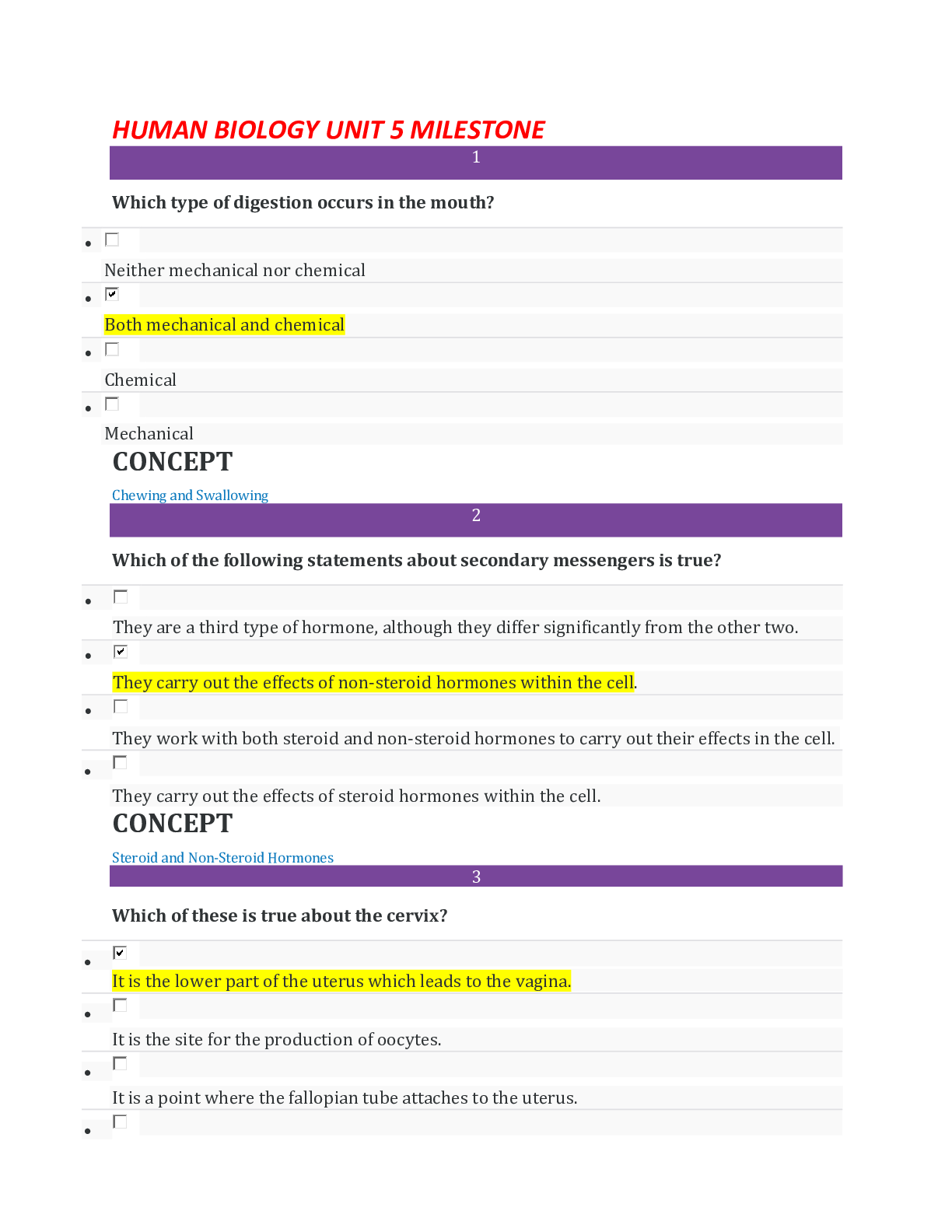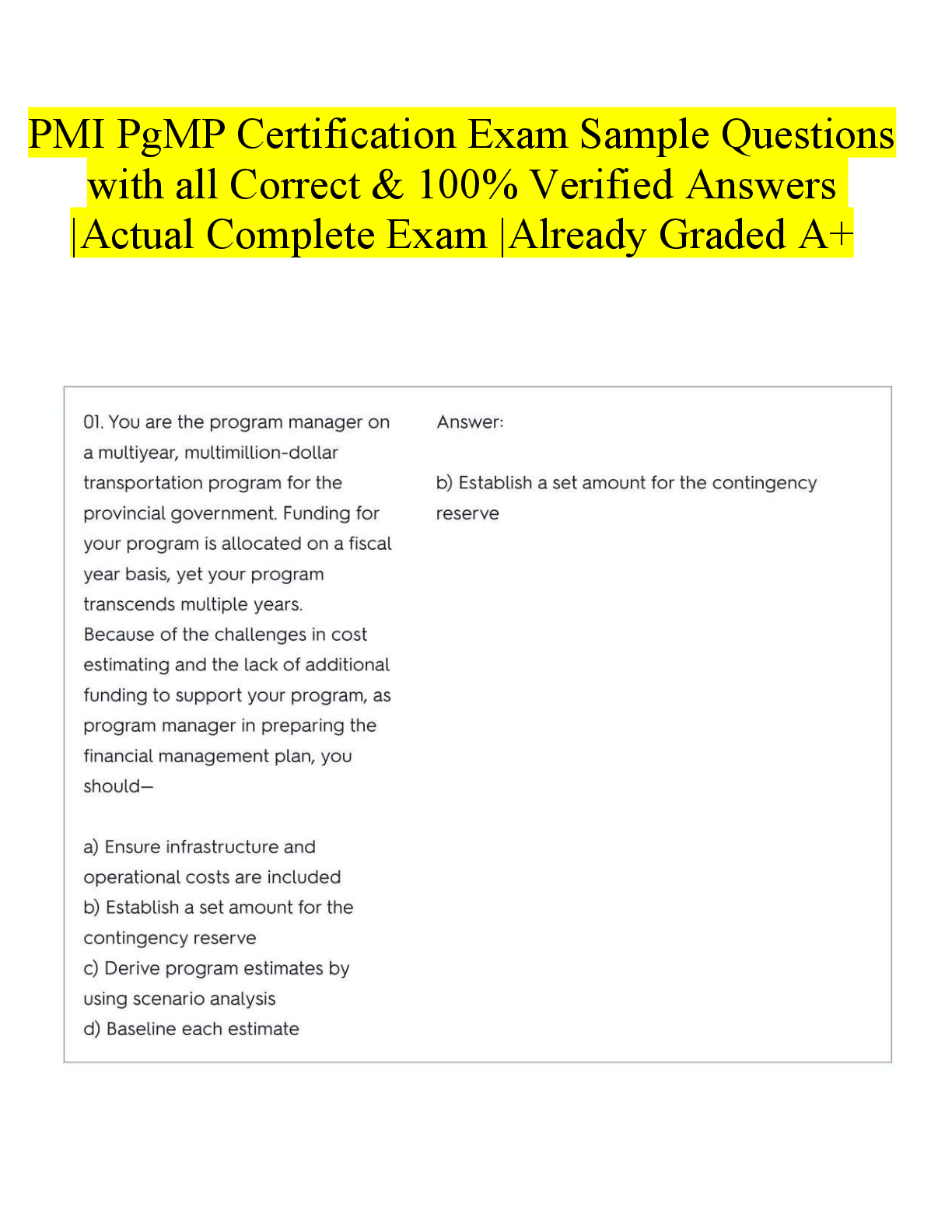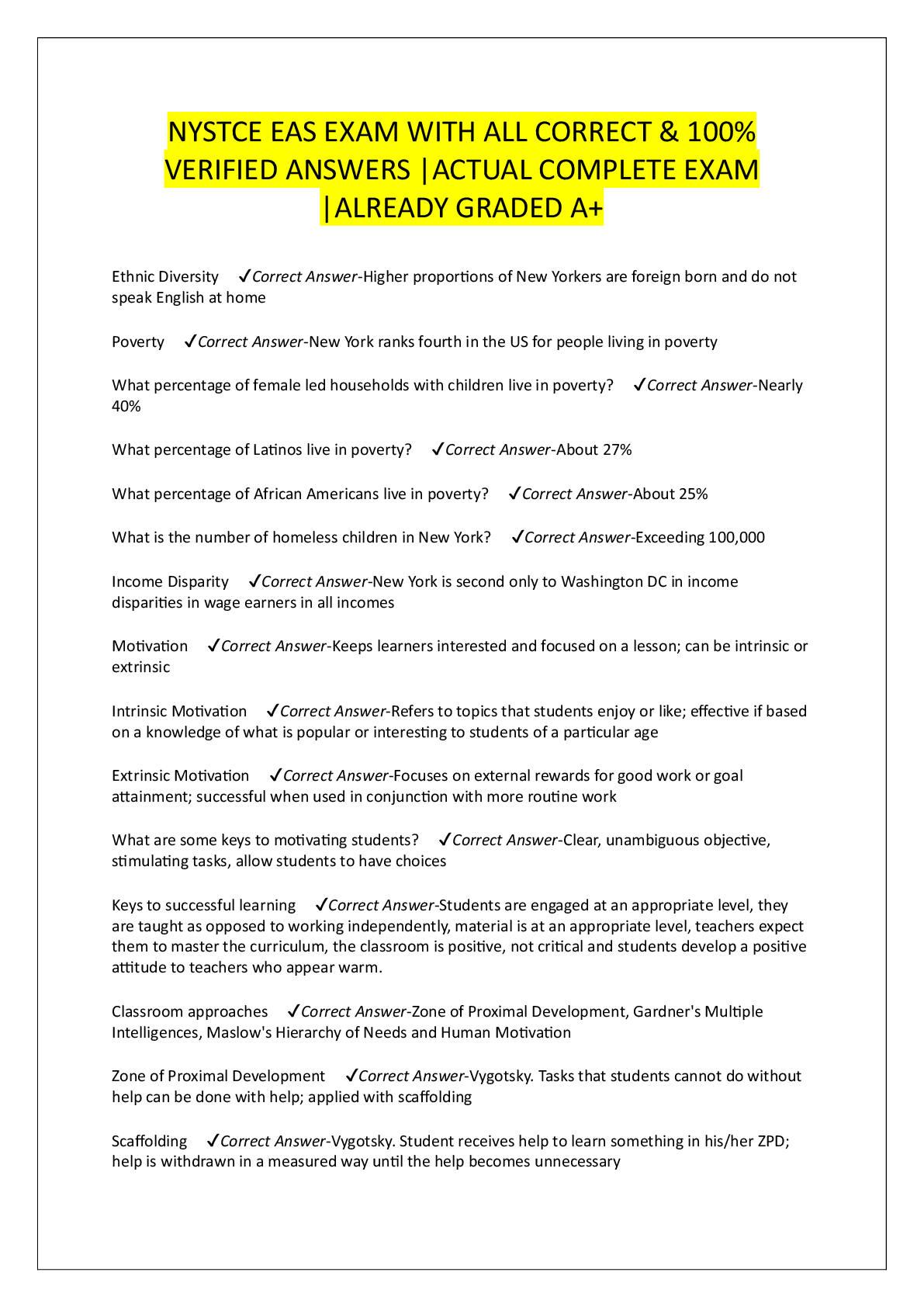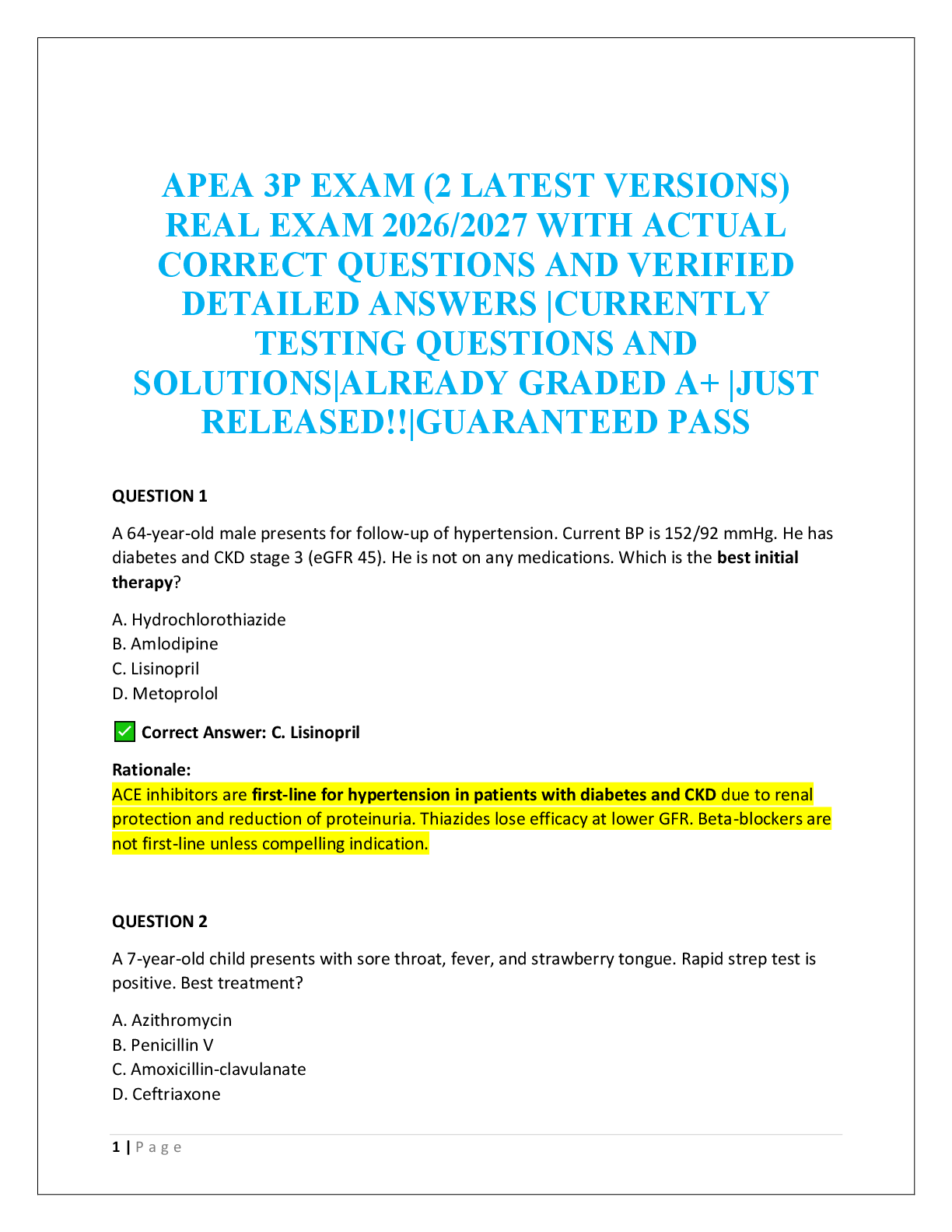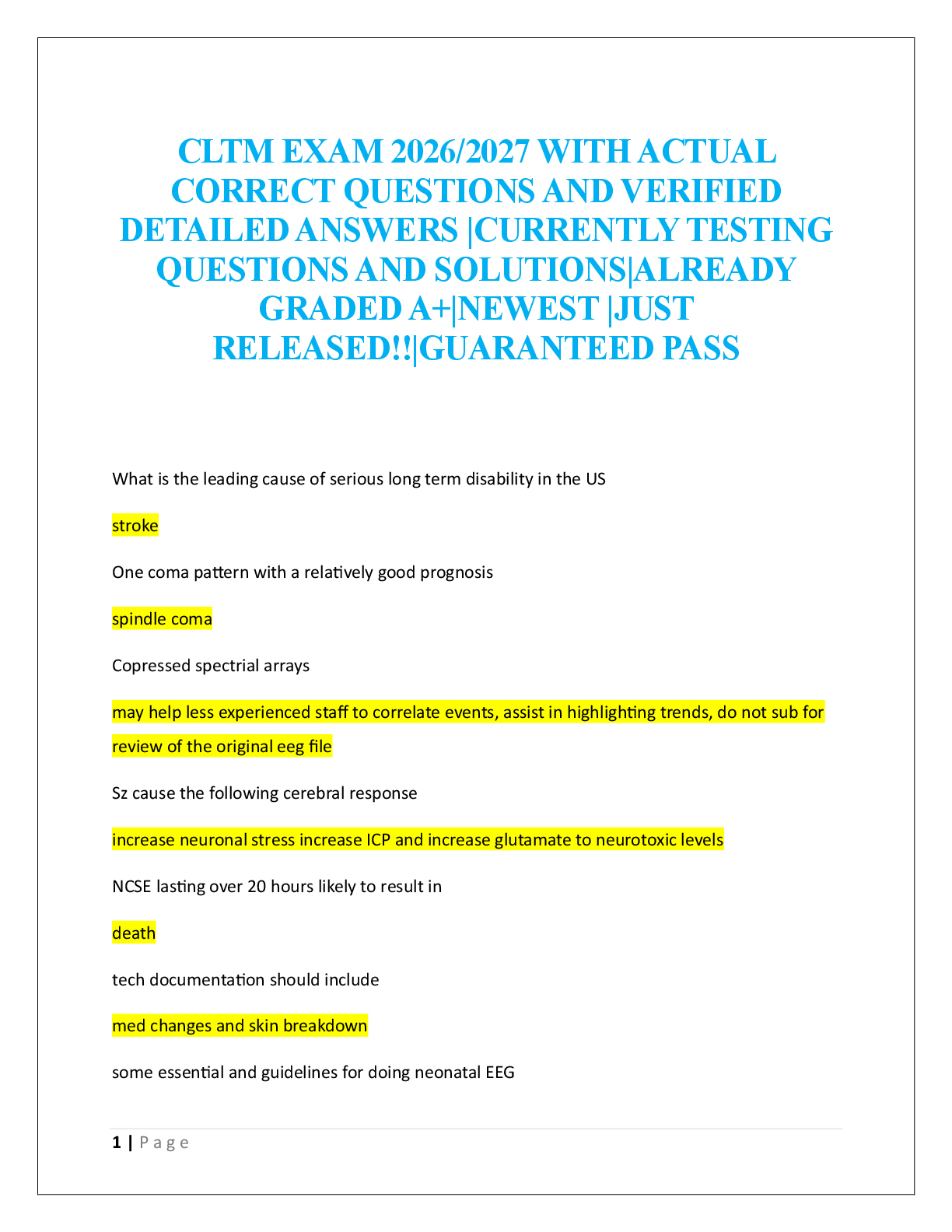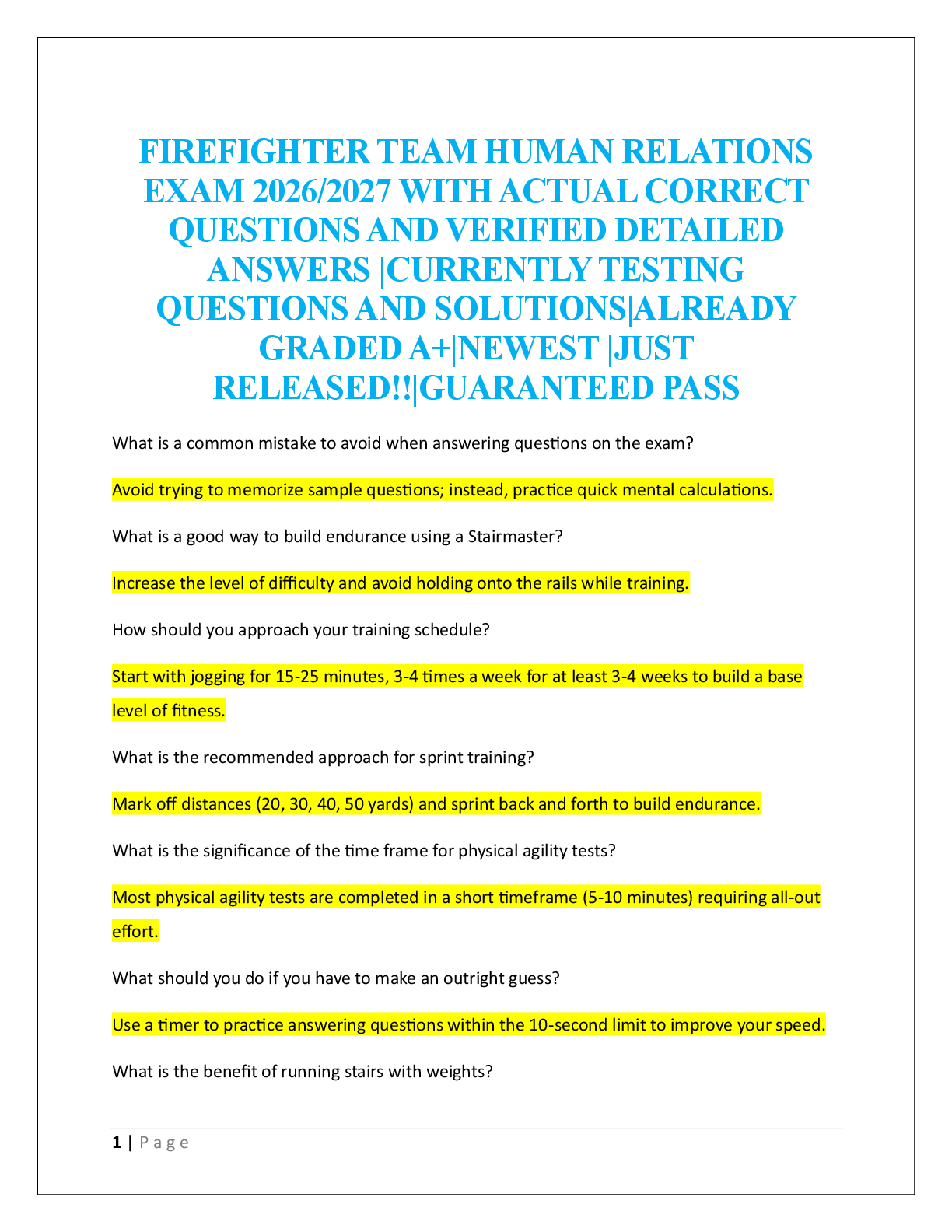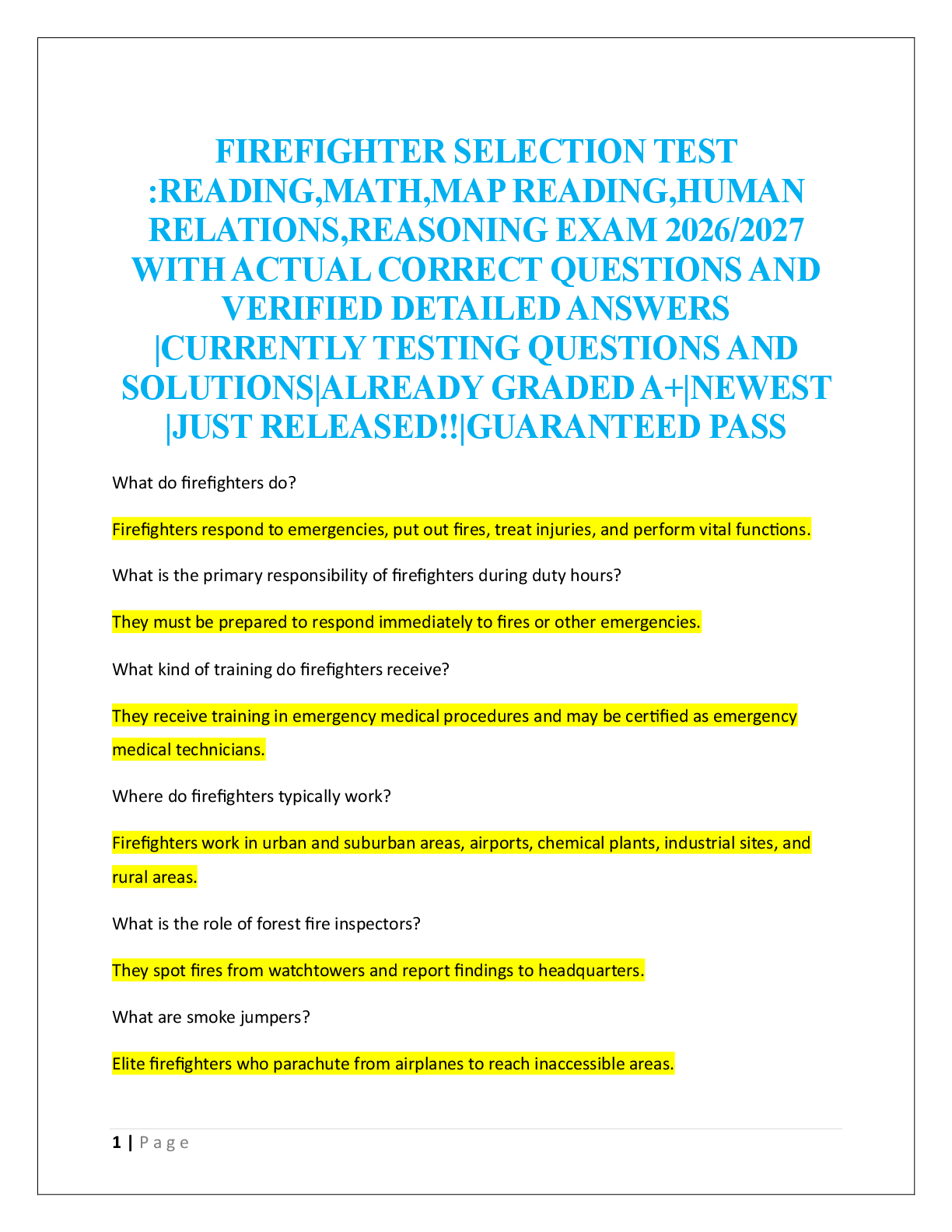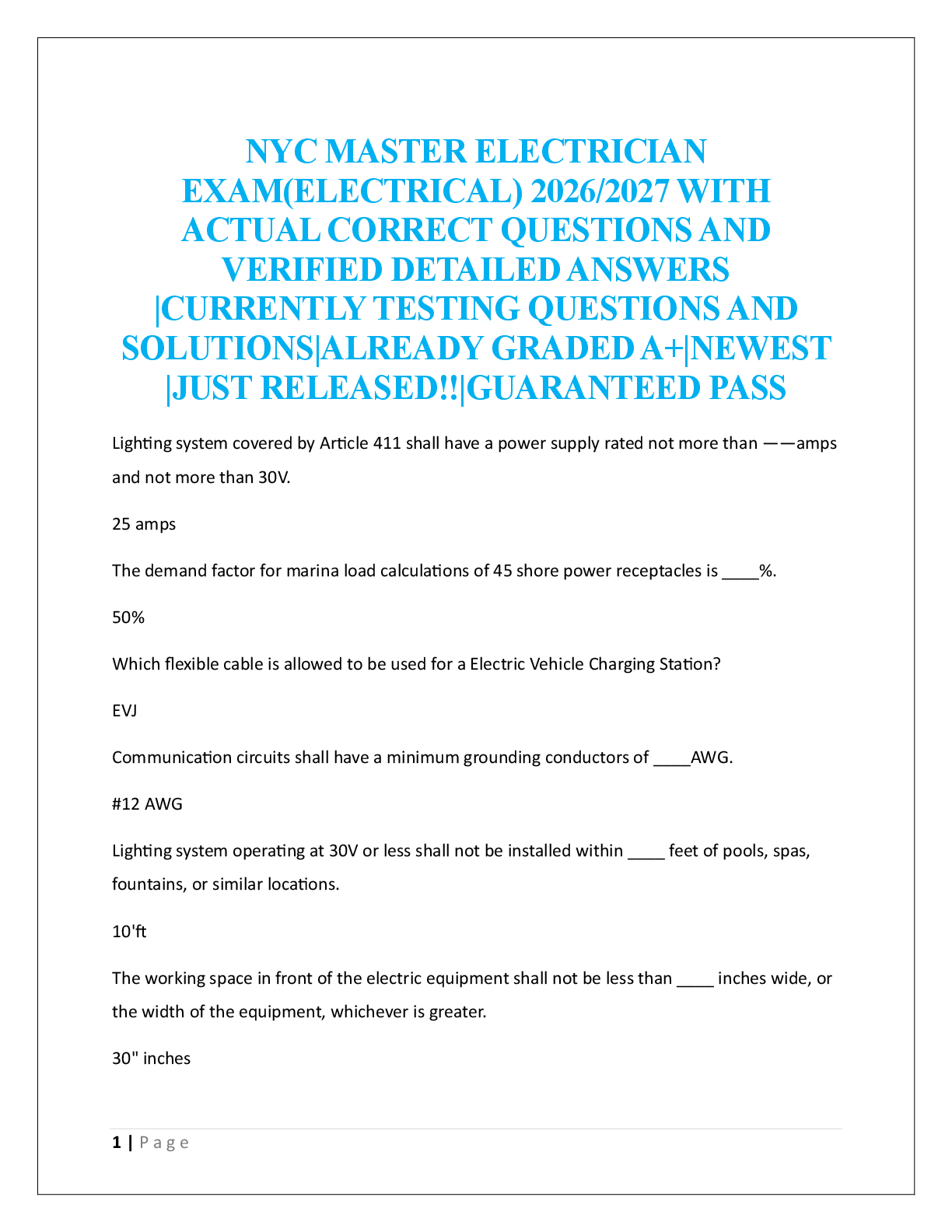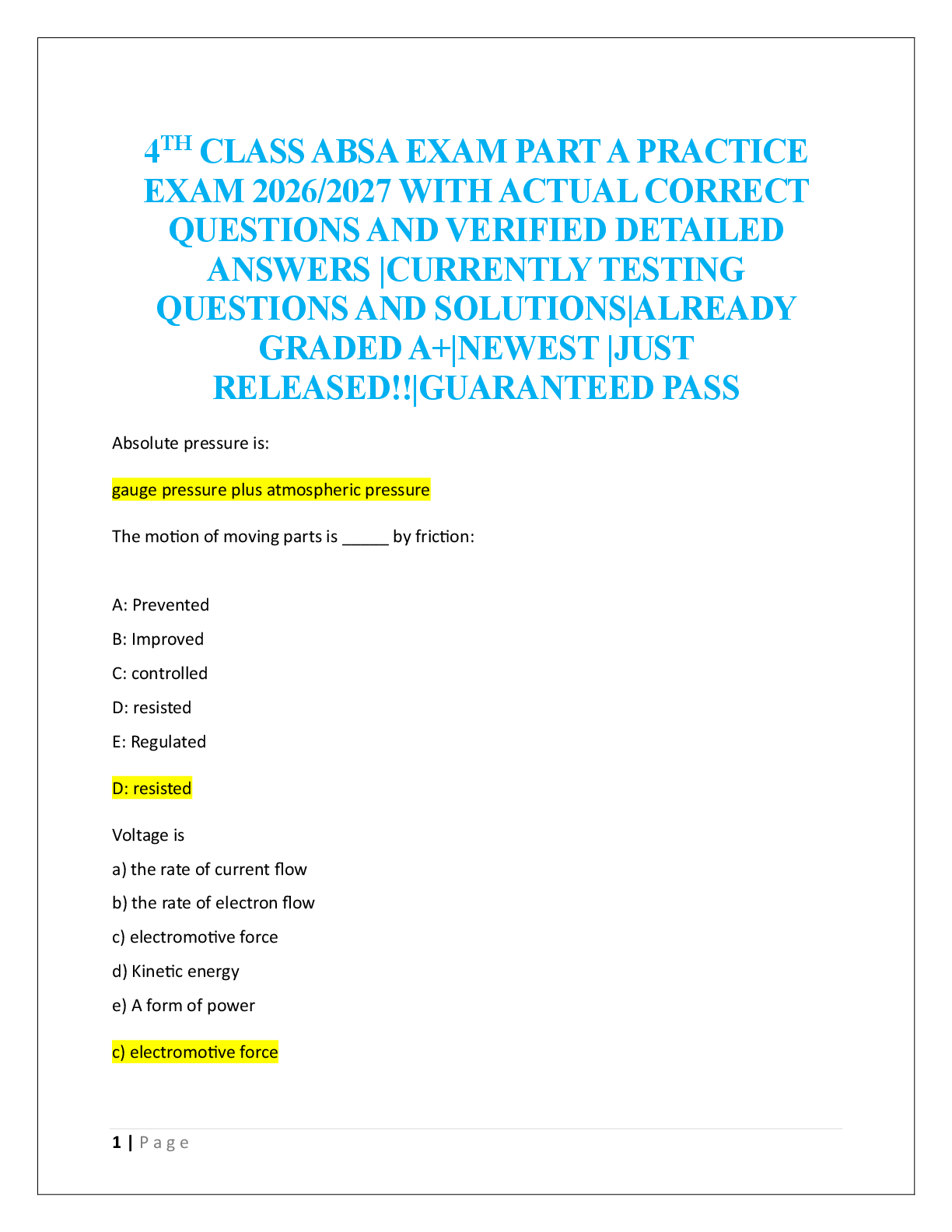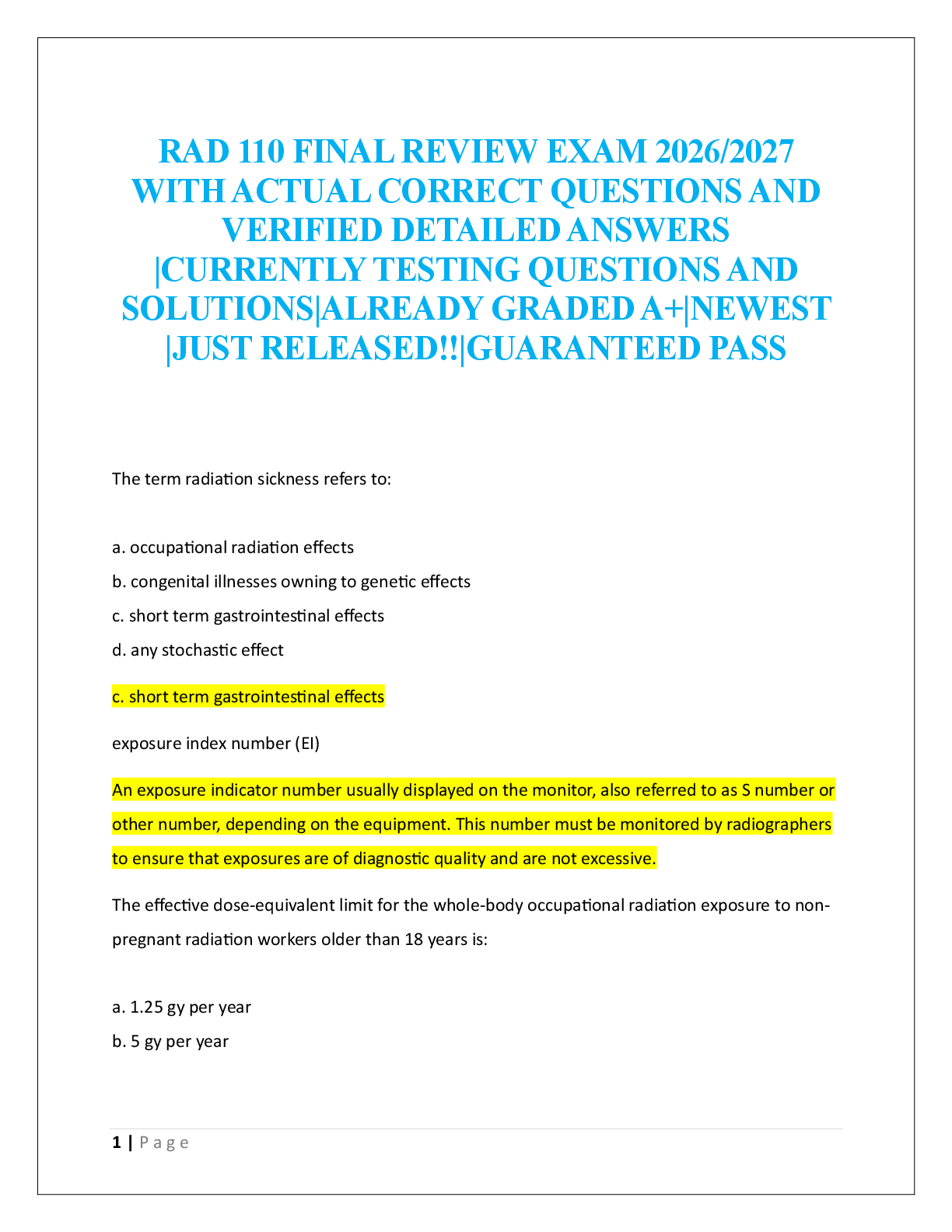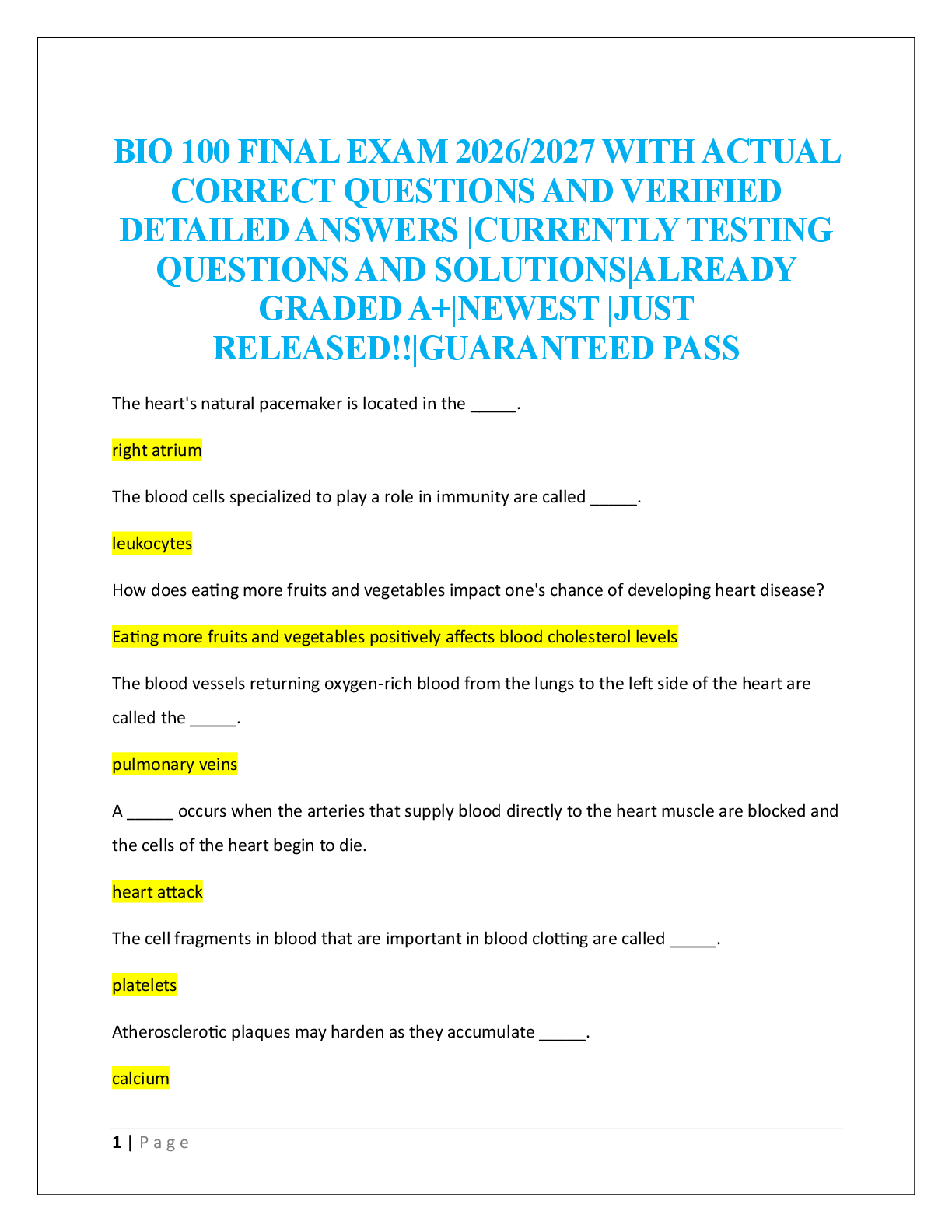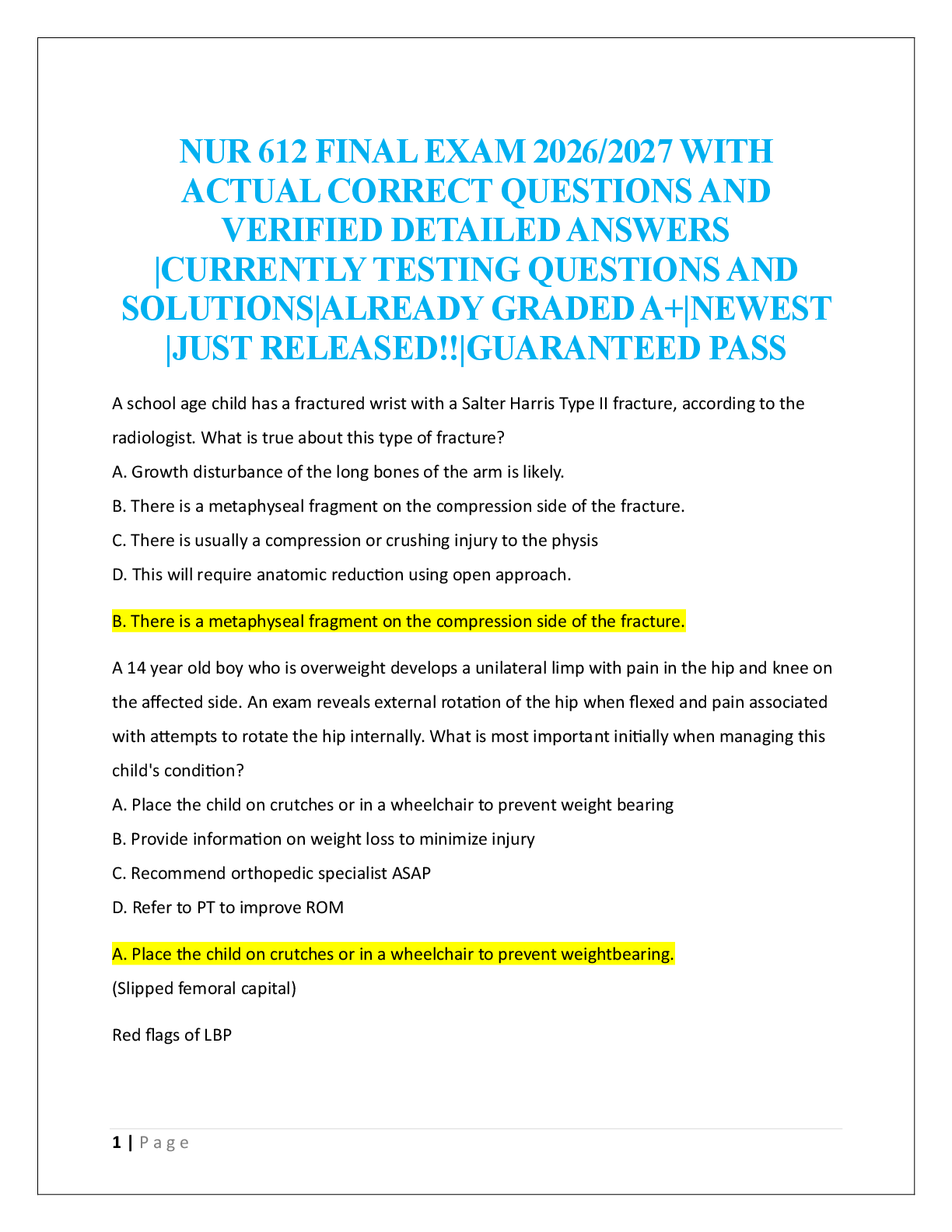Business Law > EXAM > BUSS 213 MIDTERM Business Law and Ethics Spring 2020,100% CORRECT (All)
BUSS 213 MIDTERM Business Law and Ethics Spring 2020,100% CORRECT
Document Content and Description Below
BUSS 213 MIDTERM Business Law and Ethics Spring 2020 (each Question 2 pts) TRUE/FALSE - Write 'T' if the statement is true and 'F' if the statement is false. 1) A sole proprietor is considered ... a separate legal entity for purposes of incorporation. ⊚ true ⊚ false 2) When one of the members dies, a joint venture is not automatically terminated. ⊚ true ⊚ false 3) A limited liability company is incorporated in the state in which it does business. ⊚ true ⊚ false 4) Today, courts hold that once an offeree begins performance on a unilateral contract, the offeror must hold the offer open for a reasonable time to allow the offeree to complete the performance. ⊚ true ⊚ false 5) The definition of a contract is any two promises. ⊚ true ⊚ false 6) If a minor enters into a contract with an adult, both parties may disaffirm the contract based upon the minor's lack of majority. ⊚ true ⊚ false 7) As a general rule, parents are not liable for contracts entered into by their minor children. ⊚ true ⊚ false 8) A promise to pay a debt that has already been discharged in bankruptcy must be in writing in order to be enforceable in some states. ⊚ true ⊚ false MULTIPLE CHOICE - Choose the one alternative that best completes the statement or answers the question. 9) Jurisdiction refers to: A) A defendant's interest in having an impartial jury preside over a case. B) The plaintiff’s interest in having a case heard in district court. C) The courts’ power to render binding decisions on parties before them. D) The power of the plaintiff to file a lawsuit in any court of his choosing. E) The power of a defendant to have a case removed to an unbiased court. 10) Which of the following is a question of fact? A) Did the vehicle run the traffic light? B) Is premeditation necessary for a first degree murder conviction? C) Is speech protected by the First Amendment? D) What is necessary for service of process? E) What elements should an answer contain? 11) If a defendant is a corporation: A) No service of process is required. B) Only the president of a corporation can be served. C) Only the agent of the corporation can be served. D) Generally either the president of the corporation or an agent can be served. E) The corporation does not have to receive service. 12) Which of the following would fall under the state court’s jurisdiction? A) Admiralty cases B) Patent and trademark claims C) Adoption D) Bankruptcy E) Federal criminal prosecutions 13) The federal court system has exclusive jurisdiction over . A) Admiralty cases only B) Bankruptcy cases only C) Federal copyright cases only D) Admiralty, bankruptcy, and federal copyright cases E) The federal court system has no exclusive jurisdiction 14) Cars R Us is a manufacturer of car parts looking to expand their business outside of their current state with suppliers in other states. As part of their contracts with new parts dealers, their attorney would insert a clause that will specify the law that will be applied to resolve any disputes under the contract. A) breach of contract B) venue C) choice-of-law D) change-of-law E) court choice 15) If a defendant fails to respond to the plaintiff’s complaint with an answer when the plaintiff’s complaint alleges facts to support a response, the plaintiff could ask the court for a(n) . A) answer on the pleadings B) judgment for cause C) final judgment D) default judgment E) entry judgment 16) What is the document called that informs the defendant of the lawsuit and explains that if the defendant does not respond to the lawsuit within a certain period of time, a default judgment will be entered? A) Complaint B) Answer C) Summons D) Instructional guide E) Transactional analysis 17) What is the correct term for the investor-owners of a corporation? A) Profit owners B) Profit and loss owners C) Approved investors D) Limited partners E) Shareholders 18) A limited liability company offers the tax advantages of a and the liability advantages similar to a , while also allowing for unlimited shareholders. A) limited partnership, sole proprietorship B) partnership, corporation C) corporation, limited partnership D) general corporation, limited liability company E) s-corporation, partnership 19) Radonna has just secured a license to sell Sonic products in her town of Normandy, Missouri. This agreement between Radonna and Sonic is known as a(n) . A) joint venture B) franchise C) joint partnership D) limited liability partnership E) entrepreneurship agreement 20) Which of the following statements is correct about the requirements of an LLP? A) The business name must include the phrase Limited Liability Partnership or an abbreviation of the phrase, and the parties must execute a Partnership Agreement. B) The parties must execute a Partnership Agreement identifying itself with the phrase Limited Liability Partnership or an abbreviation of the phrase, and the parties must file a form with the secretary of the state. C) The business name must include the phrase Limited Liability Partnership or an abbreviation of the phrase, the parties must execute a Partnership Agreement, and the parties must file a form with the secretary of the state. D) The business name must include the phrase Limited Liability Partnership or an abbreviation of the phrase, and the parties must file a form with the secretary of the state. E) The parties only need to file a form with the secretary of the state. 21) An agreement consists of . A) consideration B) capacity C) coherence D) an offer and acceptance E) a concurrence of the parties 22) Who is the person who agrees to the terms of an offer made by another party? A) Offeror B) Offeree C) Acquirer D) Agreer E) Inquirer 23) Which of the following is the reason the Uniform Commercial Code was drafted? A) Different states had different laws governing contracts which did not result in a smooth flow of interstate commerce. B) Some states had no law governing contracts. C) Federal law governing contracts was difficult to apply. D) The Uniform State Act on laws was not working. E) The Restatement of the Law Second, Contracts was not being evenly and fairly applied. 24) Which of the following is true of an offer made in jest? A) Even if an offer is clearly a joke, the words are treated as an offer. B) A joke is always treated as a serious offer, unless the person specifically states: “I’m joking.” C) A joke is never treated as a serious offer. D) A joke is treated as a serious offer if the outward manifestation of intent would lead a reasonable person to believe it was intended as a serious offer. E) The court will look to a person’s secret or hidden intent to attempt to discern if a joke was an offer or not. 25) Tonya runs a bakery and she wants to attract new customers. She publishes an ad in a community newspaper indicating that the first 200 people who come in on Monday the 24th of August can buy a muffin for just $1 if they arrive between 9:00 AM and 4:00 PM and bring in a dollar bill. Is Tonya’s ad an offer? A) No, it is an offer to make an offer. B) No, because advertisements can never be offers. C) No, because it does not reflect Tonya’s specific intent to make an offer. D) Yes, because all advertisements are offers. E) Yes, because it specified a limited quantity and provided a specific means by which the offer could be accepted. 26) When, generally speaking, is a revocation effective? A) When it is mailed by the offeror. B) When it is received by the offeree. C) Immediately upon the offeror’s decision to revoke. D) Within 24 hours of the offer being made. E) Whenever the offeror decides not to accept the offer. 27) Judith, an ill-tempered business law teacher, offers $50 to any student who will mow her lawn. Peter goes right over and begins mowing. Just before he finishes, Judith goes over and tells him that she revokes her offer. Which of the following is true regarding Peter's entitlement to payment? A) Peter is not entitled to payment because a bilateral contract was involved that could only be accepted by full performance prior to revocation. B) Peter is not entitled to payment because a unilateral contract was involved that could only be accepted by full performance prior to revocation. C) Peter is entitled to only a proportional recovery based on the amount of work he had done prior to the revocation because Judith always retained the right to validly revoke. D) Peter is entitled to recover because a unilateral contract was involved, and he was entitled to a reasonable amount of time to complete the job. E) Peter is entitled to recover because a bilateral contract was involved, and he was entitled to a reasonable amount of time to complete the job. 28) Why is there no consideration when a party does what it is already legally obligated to do? A) Because there will not be adequate consideration. B) Because promising to do something you are obligated to do is an illusory promise. C) Because of the legal doctrine of promissory estoppel. D) Because there is no detriment. 29) Nina, an experienced pool contractor, and Charlie agree on a price for Nina to build a pool in Charlie's backyard. Nina discovers that she did not initially include a sufficient charge for labor in her original price. She informs Charlie that unless she receives an extra $5,000 with which to hire workers, she cannot complete the job. Charlie agrees, thinking to himself that he has a way out. When Nina finishes the pool, Charlie refuses to pay the additional $5,000. Which of the following is the most likely result of their dispute? A) Charlie will be required to pay because a typical, unilateral contract is involved, and he got the benefit of his bargain. B) Charlie will be required to pay because a typical, bilateral contract is involved, and he got the benefit of his bargain. C) Charlie will be required to pay because unforeseen circumstances are an exception to the preexisting duty rule. D) Charlie will not be required to pay because Nina provided no additional consideration, and the preexisting duty rule applies. E) Charlie will only be required to pay ½ of the agreed upon amounts because of the calculations involved under the preexisting duty rule. 30) is the third element of a legally binding contract. A) Promise B) Acceptance C) Capacity D) Intent E) Affirmation 31) Because their contracts are , minors have the right, until a reasonable time after reaching the age of majority, to or void their contracts. A) Void; disaffirm B) Void; affirm C) Void; resist D) Voidable; disaffirm E) Voidable; affirm 32) Gordon is 17 years old. He enters into a contract with Constance for a new stereo system. When Gordon turns 18, he moves away to college, taking the stereo system with him. This is a form of: A) express disaffirmance. B) implied disaffirmance. C) a contract for necessities. D) implied ratification. E) express ratification. 33) is a term for laws that limit the types of business activities in which parties may legally engage on Sundays. A) Sunday prohibition laws B) Christian fellowship laws C) Blue laws D) Homestead laws E) Fellowship laws 34) Legal assent involves that the courts will require the parties to obey. A) a promise B) a special agreement C) bilateral assent D) contractual affirmance E) legal affirmance 35) For a valid contract, courts insist on a . A) meeting of the parties B) meeting of the minds C) mutual meeting D) contractual meeting E) meeting of assent 36) Contracts for the sale of goods totaling more than $500 must be in writing according to . A) federal law B) Contract Federation Rules C) the Uniform Commercial Code D) state statutes E) Uniform Contract Rules 37) is the term for contracts within the statute of frauds involving promises to pay a debt of another if the initial party fails to pay. A) Promissory estoppel B) Elementary promises C) Debt reconciliation D) Debtor’s friend E) Secondary obligation 38) Within the statute of frauds, the is an exception as to when a secondary obligation does not need to be in writing. A) primary-purpose rule B) resulting-fact rule C) main-purpose rule D) delineated rule E) personal-obligation standard 39) What is a purpose of the parol evidence rule? A) To restrict oral evidence from being admitted that supports an agreement in its written form. B) To restrict written evidence from being admitted that supports an agreement in its written form. C) To restrict oral and written evidence from being admitted that supports an agreement in its written form. D) To restrict hearsay from being admitted that supports or contradicts an agreement in its written form. E) To restrict evidence from being admitted that substantially contradicts an agreement in its written form. 40) Which of the following is not an exception to the parol evidence rule? A) Evidence of usage of trade. B) Ambiguous evidence. C) Contracts that have been subsequently modified. D) Contracts based on terms that were agreed on orally. E) Evidence of prior dealings between the parties. 41) Contractual conditions consist of . A) conditions precedent only B) conditions precedent and subsequent only C) conditions precedent and concurrent only D) conditions precedent, subsequent, and concurrent E) conditions nominal and concurrent 42) Juan and Carlos enter into a contract which states: “Carlos will paint Juan’s bedroom in Juan’s house white and Juan promises to pay Carlos $100 upon completion.” Which of the following is an example of an implied condition? A) That Carlos will paint Juan’s bedroom. B) That Carlos will use white paint when painting Juan’s bedroom. C) That Juan will pay Carlos $100. D) That Juan will pay Carlos upon completion of the painting. E) That Juan will allow Carlos access to his bedroom 43) Which of the following occurs when parties agree that they simply wish to discharge each other from their mutual obligations and therefore rescind or cancel the contract? A) Accord and satisfaction B) Novation C) Substituted contract D) Mutual rescission E) Alteration SECTION BREAK. Answer all the part questions. 44) [Puppy Woes] Ronaldo promised to sell Linda a Dalmatian puppy for $700 but backed out of the deal. Linda sued Ronaldo in state court for breach of contract and asked for a jury to hear the case. During jury selection, one juror, Mika, said that she did not think she could be fair to Linda because Linda did not appear to be a dog lover. Linda's lawyer asked that Mika not hear the case on the basis that she could not be fair, and the judge excused Mika. Linda also decided that another juror, Sandy, looked at her in a grumpy manner so, without a reason given, Linda's lawyer asked the judge to excuse that juror from serving. The judge did so. After the jury was chosen, Linda's lawyer made a statement to the jury, as did Ronaldo's lawyer. Linda's lawyer then called to the witness stand Jules, a friend of Linda, who heard the discussion held between Linda and Ronaldo regarding the purchase of the puppy. Jules testified under questioning by Linda's lawyer that she heard Linda say that she would pay $700 for the puppy and that she also heard Ronaldo say that he would sell the dog for that amount. Unfortunately for Linda, Jules also testified in response to questioning by Ronaldo's lawyer that Ronaldo distinctly told Linda that he would only sell the puppy to her if Linda came with cash for the puppy within seven days. Linda did not show up with the money for ten days and Ronaldo had already sold the dog to someone else. The judge ruled in favor of Ronaldo. 44) When lawyers choose a jury, it is called . A) Voir dire B) Jury analysis C) Jury review D) Ven dere E) Shadowing 45) The challenge Linda’s lawyer made to Mika is referred to as a[n] . A) Peremptory challenge B) Challenge for cause C) Stipulated challenge D) Fairness challenge E) Approved challenge 46) Once Linda’s attorney presented all the evidence, Ronaldo’s attorney could ask for a[n] . A) directed verdict B) closing argument C) immediate dismissal D) redirect examination E) mistrial 47) The statements made to the jury by the lawyers immediately after the jury was chosen are referred to as . A) Direct statements B) Closing selection statements C) Jury statements D) Influential statements E) Opening statements 48) When Linda’s lawyer questions Jules, it is called , and when Ronaldo’s lawyer questions Jules, it is called . A) Absolute examination; counter-examination B) True examination; analysis examination C) True examination; trickster examination D) Direct examination; interrogating examination E) Direct examination; cross-examination BONUS QUESTIONS [Daria’s Bakery] Daria decided to open her own bakery. She decided she did not need a lawyer to advise her on different forms of ownership. Unfortunately, Daria had not paid attention in business law class. She proceeded to simply open her business called Daria's Bakery. Eli told Daria that he wanted to order some cookies for his girlfriend, Kirsten, but that Kirsten had allergies to peanuts. Daria told him not to worry because she would make up a special batch just for him. Daria had hired some assistants because she was so busy. She told an assistant, Kate, to make up several batches of cookies for different customers including Eli and told her to leave out the peanuts in Eli's batch because of the allergy. Kate, however, forgot about the peanut allergy and proceeded to make Eli's cookies with peanuts. Eli picked up the cookies and gave one to Kirsten in the car. Kirsten became violently ill, vomited in Eli's car, and had to have her stomach pumped. Eli and Kirsten sought recovery from Daria who told them that Kirsten's doctor bill and Eli's car cleaning bill were business debts, that the business was new and not making any money at the moment, and that she had no personal liability. Following the incident involving Eli and Kirsten, Daria discussed her problems with the bakery with her parents. Daria's parents would like to invest in her business and share in any profits, but they do not want to share in the management responsibilities. 1) Daria initially set up which type of business? A) A franchise B) A sole proprietorship C) An individual proprietorship D) A general company E) An S corporation 2) Which of the following is a true statement regarding Daria's statement that she had no personal liability? A) She was correct. B) She was correct only if she can establish that she has paid all her business taxes on time. C) She was correct only if she can establish that she has at least 5 employees. D) She was incorrect. E) She was incorrect unless she signed an agreement with a financial institution in order to get a loan for the business and agreed in the document that she would not accept personal liability for any losses. 3) Which of the following would be an appropriate form of business organization for Daria and her parents, such that her parents could invest but not participate in management? A) General partnership B) Limited partnership C) Managed partnership D) Combined partnership E) Family-Based partnership [Book Sale] Yasmeen offered to sell Dylan a used business law book for $50. She told him that he could use it in his upcoming business law class the next semester. However, there was a problem with the book; it was several editions old. Dylan was not aware of that fact, and neither was Yasmeen. When Dylan took the book to class and realized the problem, he went back to Yasmeen requesting a refund. Yasmeen refused to return his money. She claimed that she did not commit fraud because subjectively she thought that the book was correct, and that a binding contract existed. The book, however, is outdated and cannot be appropriately used in the class. 4) Which of the following would describe Yasmeen's role in the transaction? A) She was the offeror. B) She was the offeree. C) She was the assentor. D) She was the assentee. E) She was the offeree and the assentee. 5) Which of the following describes Dylan's role in the transaction? A) He was the offeror. B) He was the offeree. C) He was the assentor. D) He was the assentee. E) He was the offeree and the assentee. 6) The $50 to be provided by Dylan in exchange for the book to be provided by Yasmeen is considered to be under contract law. A) consideration B) material obligations C) contractual capacity D) provisions E) equitable remedies 7) Which of the following is true regarding Yasmeen's claim that she subjectively believed the book was an appropriate edition and that an enforceable contract, therefore, existed? A) She is correct because contract law is based upon a subjective theory of contracts. B) She is correct because her genuinely held belief establishes that she did not commit fraud. C) She is correct because agreements for the sale of goods are based on a subjective theory. D) She is incorrect because her subjective belief would not be the basis for a determination of whether the contract would be enforced in this case and also because fraud is not necessary in order to find a breach of contract. E) She is correct but only if Dylan subjectively believed the same as she did. 8) Which analysis of the effect of the discovery that Dylan has a book that is not appropriate for the class would be correct? A) Dylan is stuck with the book because he objectively agreed to purchase it. B) Dylan is stuck with the book because Yasmeen did not commit fraud. C) Dylan is stuck with the book because Yasmeen subjectively thought it was the correct book, and Dylan did not openly disagree before the contract was executed. D) Because the parties had a mutual misunderstanding, the parties did not come to a meeting of the minds, and there is no contract. E) Because both parties were mistaken, at Dylan's option he may return the book; but only half of the purchase price would be required as a refund from Yasmeen because she is not guilty of fraud. [Show More]
Last updated: 3 years ago
Preview 1 out of 26 pages
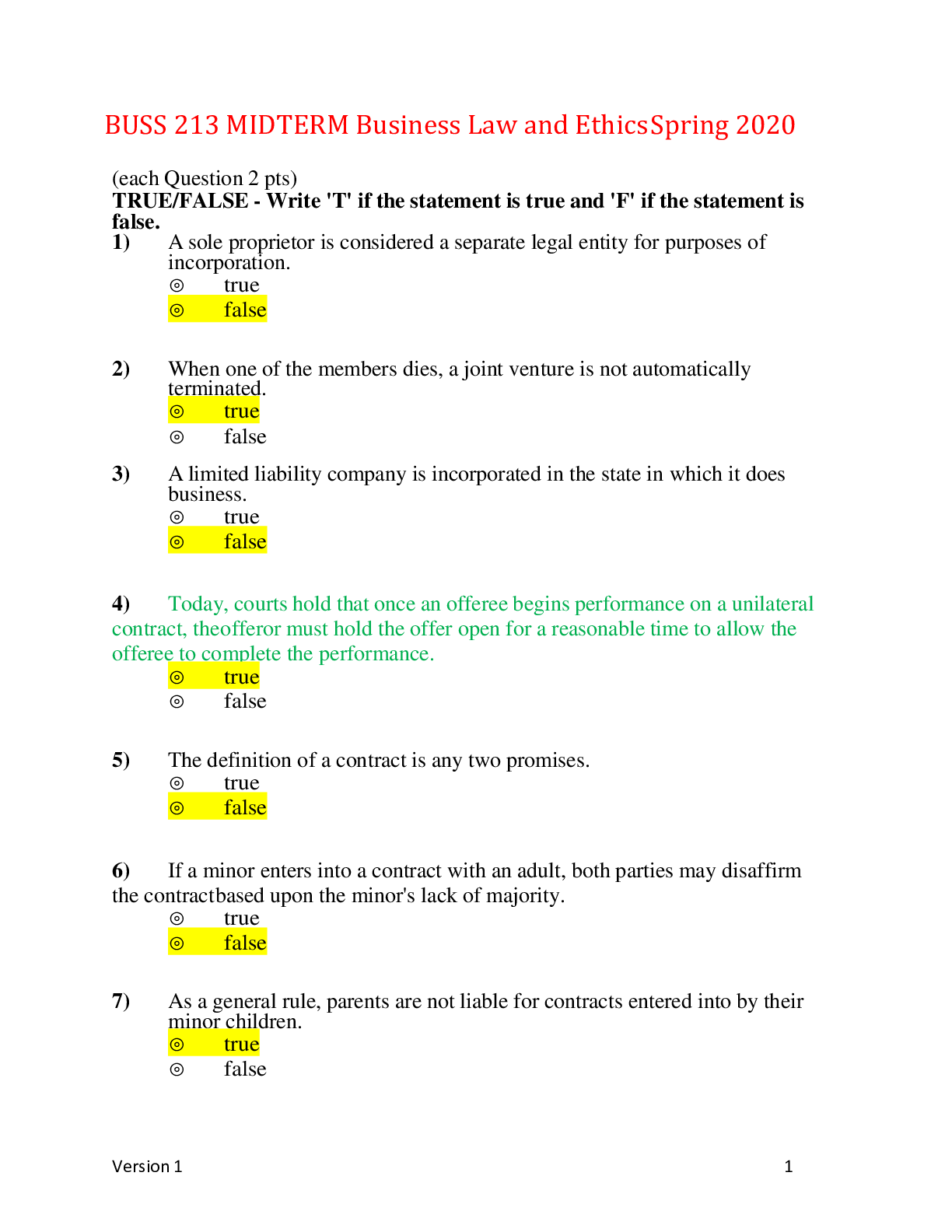
Buy this document to get the full access instantly
Instant Download Access after purchase
Buy NowInstant download
We Accept:

Reviews( 0 )
$16.00
Can't find what you want? Try our AI powered Search
Document information
Connected school, study & course
About the document
Uploaded On
Aug 12, 2022
Number of pages
26
Written in
All
Additional information
This document has been written for:
Uploaded
Aug 12, 2022
Downloads
0
Views
128



